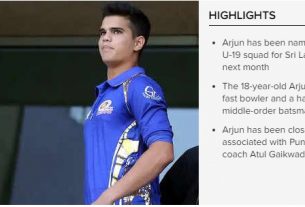Shared News: December 5, 2021 7:48:12 am
Throughout the game, the players were giving each other choices, a reason why they were consuming a lot of time, as everything looked similar and they had to take decisions. (International Chess Federation/Twitter)
It was an amazing game (Game 6). Even Magnus (Carlsen) said that people might remember him as someone who won a World Championship game after five years; the first decisive game in classical chess after such a big gap. It was a pretty tongue-in-cheek comment. The last decisive game happened in 2016.
I was commentating with Judit Polgar and for eight hours and 45 minutes, it was a fantastic experience. The game was played at a very, very high level. It was a roller-coaster. It’s very easy to get completely confused, only when you start analysing deeper do you understand the intricacies and complications.
At some point, Nepo (Ian Nepomniachtchi) was taking a bit of initiative. On a number of occasions, he avoided simplifications. If he wanted to push for a draw, he could have also achieved that at the beginning. After the opening phase, Nepo had a slightly preferable position, where he could have simplified things in certain cases. But he didn’t, choosing a complex line instead. It gradually became more complicated and after a point, Magnus took over.
Today's 'Twitter question' at the press conference came from @Dai_Wales:
There have been a lot of great world championship matches over the years, but if you could watch one match between any two players of any era, who would you choose? pic.twitter.com/f8uX1YLsbo— International Chess Federation (@FIDE_chess) December 4, 2021
Then, there was a phase when according to the computer world, Magnus blundered. But from a human point of view, it was insanely difficult to see that kind of geometry; bringing your active rook back in order to protect your rook. Then you put your knight in a corner and go back to attack the opponent’s king, while in the process you are sacrificing your entire queenside army. As a player and as a commentator, you know how inhuman that particular combination is. It was understandable that Magnus missed it.
Then again, for a large phase, the computer kept on saying it’s a draw, and me and Judit kept screaming how difficult the position was for black. Imagine a position where white has 10 different moves and every move is a draw, whatever he plays he can make a draw. Now, black has the same position, where he has to make 10 accurate moves and only then it’s a draw. So from a human point of view, would you call this favourable for white or black? Obviously, it’s favourable for white, for white can play anything and it’s still a draw, but from black’s point of view, he has to find all correct moves and then it’s a draw. Computer doesn’t analyse in this manner. It will say 0.00. Even if you have to play 100 correct moves and then it’s a draw, it’s still 0.00 on computer evaluation. So that can be very tricky, particularly for those who aren’t professional chess players or not playing at a certain level. They might think, it was equal on computer evolution and Nepo lost from an equal position. But practically, it was very difficult.
Maurice Ashley: "Did yesterday's game make any impact on your choice of opening today?"
Ian Nepomniachtchi: "Absolutely not." pic.twitter.com/pRxuzVG6Ew— International Chess Federation (@FIDE_chess) December 4, 2021
Options give complications
Throughout the game, we could see the players were giving each other choices, a reason why they were consuming a lot of time, as everything looked similar and they had to take decisions. It’s always easy to take decisions that are forced, in life as well as in chess. Having different options makes things complicated.
The opening (in Game 6) was a great psychological move by Magnus. The third move, when he played g3, I have never seen this before in a World Championship match. He was aiming for a Catalan opening but with a different move order, not very popular. Nepo chose to play his set-up (against that), which he employed in Game 2. He thought for a while, but stuck to a similar set-up. It gave Magnus a different kind of a line, similar to Catalan, but we can’t exactly call it a Catalan. When Nepo came with a very interesting move, b5, the positions got neutralised and as I said, Nepo had zero issues in the opening.
I think Magnus is a huge favourite now because a game like this saps your energy like anything, particularly if you are on the losing side. You play a game for eight hours and 45 minutes, then you attend a press conference and by the time you get to your room, your seconds will be waiting. When you think about this game… chess is a game where you can identify one particular mistake. You know exactly where you went wrong and how you went wrong. So by the time you go to sleep, it’s already late in the night. Then you have to wake up in the morning and prepare again (for the next game). And let’s not forget that Magnus always has more energy than his opponent.
Knowing Magnus, I know he will not shut up shop, just because he has the advantage now. The moment he knows he has a chance, he will try to squeeze the maximum out of it. In Game 7, he will play with black and maybe won’t mind a short draw (it panned out like that). But in general, he would like to have as many long games as possible.
Grandmaster Surya Sekhar Ganguly was one of Viswanathan Anand’s seconds and assisted him in winning the World Championship matches against Vladimir Kramnik and Veselin Topalov. He spoke to Shamik Chakrabarty



